Artículo
Epigenetic Alterations in a Gastric Leiomyoma
Branham, Maria Teresita ; Pellicer, Monica; Campoy, Emanuel Martin
; Pellicer, Monica; Campoy, Emanuel Martin ; Palma, Marcelo; Correa, Agustín; Roqué, Monica Laura
; Palma, Marcelo; Correa, Agustín; Roqué, Monica Laura
 ; Pellicer, Monica; Campoy, Emanuel Martin
; Pellicer, Monica; Campoy, Emanuel Martin ; Palma, Marcelo; Correa, Agustín; Roqué, Monica Laura
; Palma, Marcelo; Correa, Agustín; Roqué, Monica Laura
Fecha de publicación:
12/2014
Editorial:
Hindawi Publishing Corporation
Revista:
Case Reports in Gastrointestinal Medicine
ISSN:
2090-6536
Idioma:
Inglés
Tipo de recurso:
Artículo publicado
Clasificación temática:
Resumen
Leiomyomas constitute 2.5% of all resected neoplasms of the stomach. They are usually asymptomatic, but may present mucosal ulceration. Aberrant DNA methylation is a well-defined epigenetic change in human neoplasms; however, gene-acquired methylation may not necessarily be related with a malignant phenotype. In this report we analyzed in a gastric leiomyoma, the methylation status of 84 CpGI in tumor suppressor and DNA repair genes. We analyzed the tumor center (TC) and tumor periphery (TP) separately. We found aberrant methylation in 2/84 CpGI in the TC portion, that is, MLH1 and MSH3, and 5/84 CpGI in the TP, that is, MLH1, MSH3, APC, MSH6, and MGMT.The gene with the highest methylation percentage in the TC and TP was MLH1. Given that MLH1methylation has been associated withmicrosatellite instability, we analyzed the status of themicrosatellite Bat-26. We found that neither the TC nor the TP presented instability.The methylation of MLH1, MGMT, and APC has been described in GISTs, but to the best of our knowledge this is the first time that the methylation of these genes has been associated with gastric leiomyoma. Further research should be conducted to identify reliable molecular markers that could differentiate between GISTs and gastric leiomyomas.
Palabras clave:
GASTRIC LEIOMYOMA
,
EPIGENETIC
,
DNA METHYLATION
,
MLH1
Archivos asociados
Licencia
Identificadores
Colecciones
Articulos(IHEM)
Articulos de INST. HISTOLOGIA Y EMBRIOLOGIA DE MEND DR.M.BURGOS
Articulos de INST. HISTOLOGIA Y EMBRIOLOGIA DE MEND DR.M.BURGOS
Citación
Branham, Maria Teresita; Pellicer, Monica; Campoy, Emanuel Martin; Palma, Marcelo; Correa, Agustín; et al.; Epigenetic Alterations in a Gastric Leiomyoma; Hindawi Publishing Corporation; Case Reports in Gastrointestinal Medicine; 2014; 12-2014; 1-5
Compartir
Altmétricas



